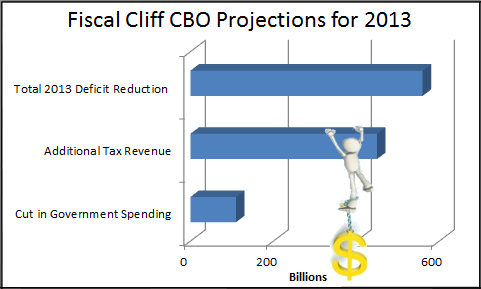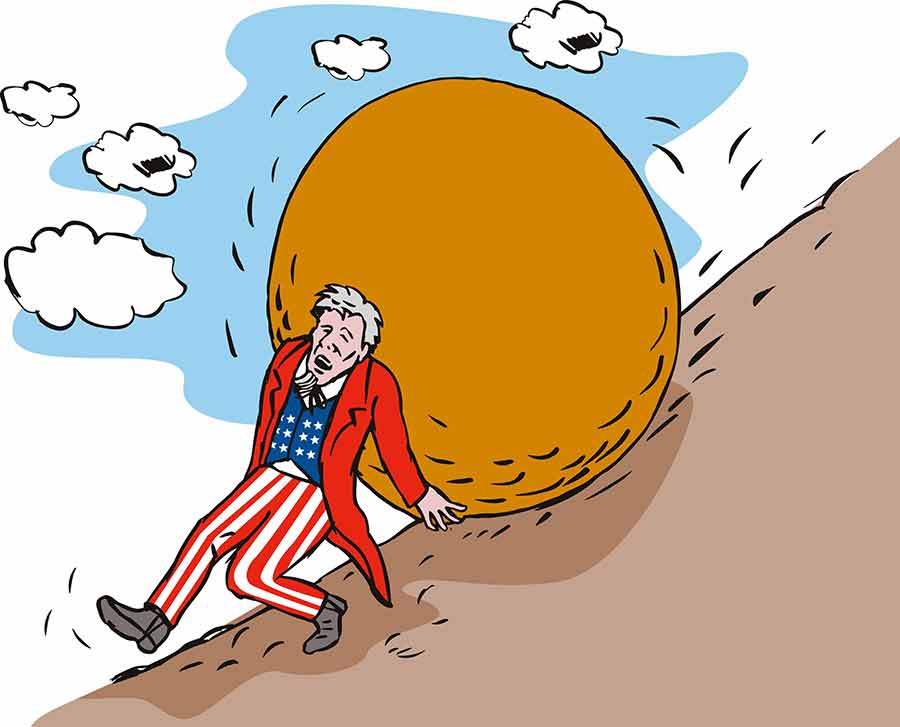The Fiscal Cliff Situation
Investors, business owners, politicians, and the media are concerned about the so called “fiscal cliff” that is coming if lawmakers fail to act before 2013 (Fiscal Cliff tax changes). The “fiscal cliff” phrase is used to describe automatic Federal spending cuts and tax increases politicians agreed to in 2011 with the Budget Control Act in order to encourage both parties to solve the deficit problem. The good news is that if the fiscal cliff comes, the annual deficit is expected to be cut in half assuming inflation stays low and the economy stays relatively strong. However, the downside risk is that the US economy enters another recession because of a rise in tax rates. What America is facing is basically a catch-22 situation.
What Tax Changes Are Scheduled with the Fiscal Cliff?
The tax increases with the fiscal cliff will be significant resulting in $440-450 billion more into the government coffers for 2013. Here is a list of a few tax increases that are scheduled to take effect in 2013 if Congress does nothing:
- Temporary Payroll Tax Cut Goes Away – This means individuals will pay 2% more in payroll taxes in 2013
- Alternative Minimum Tax (AMT) Patch Expires – This means the exemption amounts for taxpayers (both filing single and married filing jointly) will decrease to their 2000 levels resulting in about 20 million more Americans being impacted by the AMT.
- Individual Income Tax Increases – The 10% bracket disappears and all incomes below $34,500 will pay 15%. Additionally, all other tax brackets rise by 3% except for the top income tax bracket which rises by 4.6%.
- New Taxes with Patient Protection and Affordable Care Act (aka Obamacare) – Medicare taxes increase by .9% and high income individuals will pay a 3.8% tax on unearned income. Furthermore, health insurance annual premiums that are more than $10,200 ($27,500 for a family) annually will face a 40% excise tax. There will also be a 2.3% excise tax on certain medical device manufacturers, an annual fee on health insurance providers, and the AGI floor for deducting medical expenses rises to 10%. Lastly, FSAs will be limited to an annual contribution of $2,500.
- Other Tax Changes – The estate tax exemption drops to 1 million and the tax rate rises to 55%. The marriage penalty will come back as the standard deduction will not be doubled for married taxpayers. The child tax credit will fall by $500. The tax rate on capital gains and dividends will rise. Also, the personal exemption phase-out and limitations on itemized deductions would return. The exemption for mortgage liability forgiveness, and bunch of other credits will be eliminated or modified.
What Spending Cuts Are Scheduled with the Fiscal Cliff?
$110 billion in automatic across the board spending reductions, or sequestrations, are expected to take effect in 2013. They will impact both defense and non-defense spending equally. In other words, $55 billion will come from defense and $55 billion will come from non-defense spending (cabinet departments and federal agencies). Entitlements are off the table.
It is important to understand though the automatic spending cuts are really reductions in the increase of spending. In other words, the US government will not spend less than it did in 2012 or spending will not be frozen at 2012 levels.
Tax Revenue Increase is 4x Larger than Cuts to Spending Increases
If the fiscal cliff in its entirety actually happens, which is highly unlikely, economic short-term pain will be felt by many Americans without a doubt. The fiscal cliff will lead to a total of $560 billion in deficit reduction for fiscal year 2013 according to the Congressional Budget Office. Of the projected $560 million in reduction, if approximately $110 billion is attributed to a decrease in planned spending increases, then roughly $450 billion is attributed to tax increases give or take. Therefore, taxpayers will be responsible for 80% of the reduction in the annual deficit while the government through austerity measures will be responsible for 20%.

The simple fact is most of the deficit reduction comes from tax hikes. These are not trivial tax hikes and they will still not be enough to pay for the all government spending. If we want taxpayers to “pay their fair share” as part of this deficit reduction or fiscal cliff, tax rates would have to fall and real spending cuts that are a lot bigger than 2% of the overall budget would have to occur. Or alternatively, tax increases could remain but bigger cuts in government spending need to happen if the government is to do its fair share.
Maybe We Need a Bigger Fiscal Cliff After All?
Let’s be honest. Even if the fiscal cliff comes, the tax hikes and spending cuts will not be enough to pay for all of the government. In other words, even with the tax increases and reductions in the government spending growth rate, going over the cliff would leave the US with approximately a $610 billion dollar annual deficit for 2013. Consequently, the US cumulative deficit will be around 17 trillion at the end of the 2013 fiscal year. The projections assume the fiscal cliff’s effect on economic growth is minimal and that inflation stays around 2%. In other words, the massive tax increases could slow down the economy resulting in less government revenue than expected and the deficit could get worse if interest rates rise because then America has to pay more interest to its creditors and entitlement beneficiaries.
Everyone is really arguing about how to pay for government. How can the US have all this government if Americans don’t pay for it? Yes, borrowing is possible. Borrowing money doesn’t mean it is free as liabilitys have to be paid back with interest. It is the same concept as if someone pays for something with a credit card. The credit card balance needs to be paid off eventually. Most people agree that if we pay for all this government, the economy will suffer. If you think this fiscal cliff is big, imagine how much bigger it must be in the future when America finally has to repay all of the government it has financed.
Many will say that the economy is weak and that we cannot afford these tax increases and spending cuts to take effect. But with that logic, if the economy is weak we cannot afford all this government. Overall, there will never be a time where pain will not be felt by individuals with all of these tax increases and spending cuts. In reality, the US must cut Federal spending dramatically or else massive tax increases on the middle class and poor will have to be implemented as taxing the rich to the sky will not be sufficient to cover the cost of government, government entitlements, and the interest due to our creditors.
Will the Fiscal Cliff Actually Happen?
Some elements of the fiscal cliff will take effect but most likely politicians on both sides will make a deal before the end of 2013 to delay many of these tax increases and spending cuts. If anything, taxes will rise on the wealthy and spending cuts will never materialize. One thing that’s certain, if America keeps kicking the can down the road in dealing with the enormous and ever-growing national deficit, America will be going over a cliff on Mount Everest instead of a small hill.



Leave a Reply
You must be logged in to post a comment.